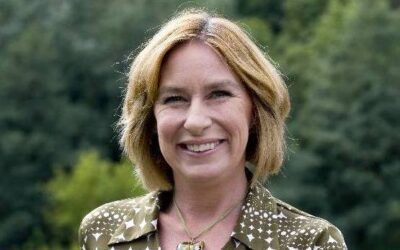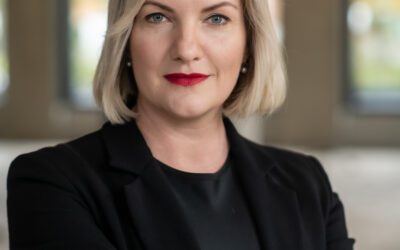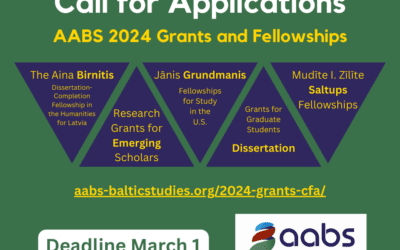AABS is pleased to congratulate Eglė Aleknaitė for the completion of the Emerging Scholars Grant (awarded 2022) associated with her project “From diversity to diversity: religion in experiences of Lithuanian migrants in the UK in the 21st century.”
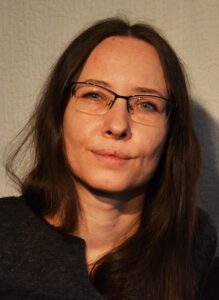
©Eglė Aleknaitė, 2023
Dr. Eglė Aleknaitė is a researcher at Vytautas Magnus University. She obtained her PhD in ethnology from the University in 2013. Since 2011, Aleknaitė has been working as a researcher in a number of national and international research projects exploring folk culture revival and religion in Lithuania. Her research interests include new religious movements, contemporary Paganism and shamanism, religion in Central and Eastern Europe, religion and nationalism, religion and migration, religion and gender, heritage politics, and revival of folk culture. Aleknaitė’s fieldwork experience spans 2009 to.2023 and includes work carried out in Lithuania, Latvia, Poland, Russia, and the UK.
The Impact of an Award: Report from Eglė Aleknaitė
After the completion of his project, Eglė Aleknaitė submitted a reflection to AABS.
We thank her for her permission to publish her thoughts, which have been lightly edited.
My research project approaches religion and migration through experiences of different religious diversities and attempts to explore how Lithuanian migrants construct, negotiate and practice their religious identity and religiosity, what factors make an impact on it; how they have experienced religious diversity and differences of its manifestations in Lithuania and the UK; what influence this experience has on their religious identity, re-imagining of religious situations in host and home countries, negotiation of national and various cultural identities and other issues intertwined with religion. I planned to use the Emerging Scholars Grant to gather empirical data needed for the project.
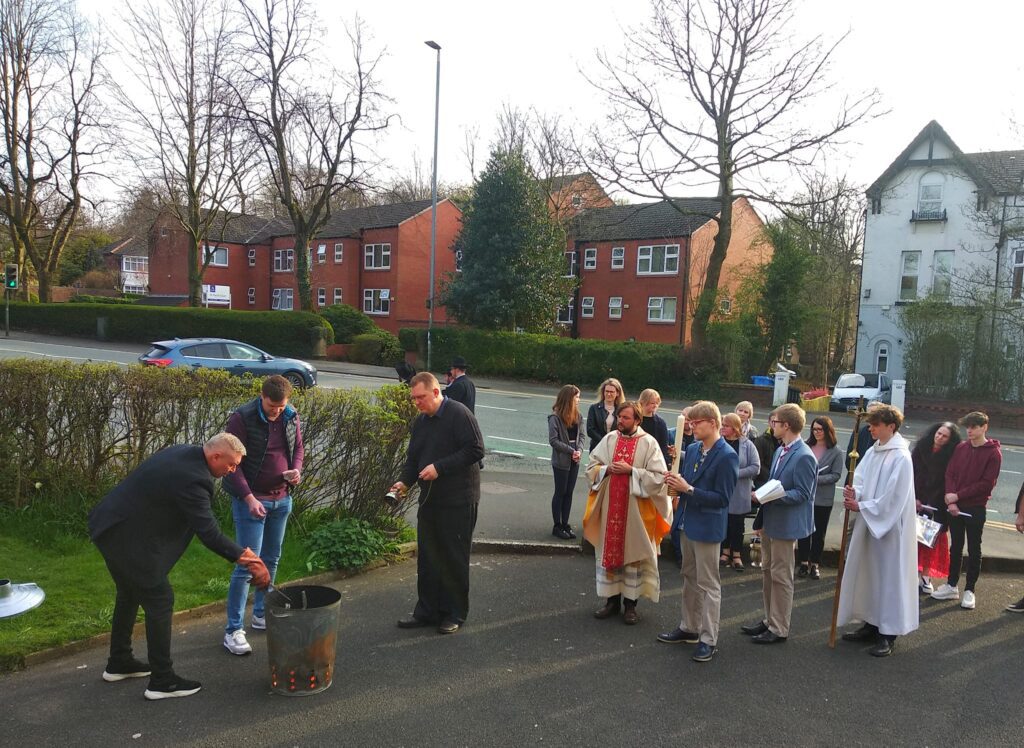
Lithuanians celebrating Easter Vigil on April 8, 2023, at the Church of Our Lady of Dolours, Manchester. © Eglė Aleknaitė, 2023
Traveling to the UK and staying in various UK localities allowed me to interview Lithuanian migrants living in areas characterized by different religious landscapes, the development of Lithuanian migrant communities, and available Lithuanian Catholic services. The fieldwork consisted of stays in London (February 24-March 22, 2023), Manchester (March 22-April 17, 2023), and Edinburgh (April 30-May 17, 2023), and interviewing of Lithuanian migrants living there and surrounding localities, as well as observations of their living neighborhoods and events. In addition, three informants living in Leeds were interviewed online via the Zoom platform. London, Manchester, Edinburgh, and Leeds as sites of my fieldwork were selected because of different religious landscapes, the development of Lithuanian migrant communities, and available Lithuanian Catholic services. London area has a huge Lithuanian migrant population that interacts with various groups of other migrants; it is the center of Lithuanian Catholicism in the UK with a Lithuanian Catholic parish, regularly held Lithuanian Catholic services and several Lithuanian organizations that are active in various fields. Manchester has two active Lithuanian communities conflicting over religious issues and Lithuanian Catholic services held once a month. Leeds and Edinburgh have no Lithuanian Catholic services held and differ in terms of their Lithuanian populations. Furthermore, all locations differ in their religious landscapes.
First-generation Lithuanian migrants who moved to the UK after 1990 were targeted for interviews. 31 informants were interviewed using a questionnaire developed on the basis of the pilot interviews conducted earlier in Leeds. The semi-structured interview questionnaire consisted of question blocks focused on informants’ religiosity and encounters with other religions in Lithuania, their religiosity and encounters with other religions in the UK, attitudes towards religious diversity, and the acceptance of Muslim refugees in Lithuania.
The informants interviewed represent a diverse group in terms of their religiosity, experiences in Lithuania, and in the UK. During my fieldwork, I tried to approach informants that differed by their religiosity in terms of being committed and practicing Catholic or being “cultural Catholic”. However, following the strategy of snowball sampling of informants I succeeded to interview some non-religious informants and informants who identified with Paganism and the Church of Latter Day Saints. In addition to references to Lithuanian migrants who have converted to Islam in interviews with other informants, these data on religious affiliations of informants question the popular image of Catholicism as an ethnoreligious marker of contemporary Lithuanian migrants and add support to the perspective of my project. Similarly, I attempted to interview Lithuanians that have various links to the Lithuanian communities in the UK. Most informants currently residing in London, Edinburgh and Leeds as well as in other locations are not involved in activities of formal Lithuanian communities.
The fieldwork in Manchester gave especially interesting and somewhat unexpected insights that suggested ideas for future research. The city had a strong community of post-war Lithuanian migrants who interacted with post-1990 Lithuanian migrants; currently, there are two active communities that differ in their attitudes toward the importance of Catholicism in their activities.
In the interviews with Lithuanian migrants, the Russian Orthodox Church appears as the most visible religious Other in Lithuania, and Islam is the most visible representative of religious diversity in the UK. In regards to religiosity and its developments in the context of migration, interaction with representatives of other religions, links with Lithuanian migrant communities, and the importance attributed to Catholicism as an element of Lithuanian identity Lithuanian migrants appear as a very diverse group.
The Grant was crucial for my research and these insights. It has allowed me to assess the impact various localities characterized by different religious landscapes, developments within Lithuanian migrant communities, and their interactions with diverse local populations have on Lithuanian migrants’ religiosity and on their views on religious diversity and various processes related to it both in their host and home countries. The fieldwork enabled by the Grant confirmed the viability of the perspective based on approaching the intersection of religion and migration through migrants’ experiences of religious diversity. In terms of my career, the Grant gave me an opportunity to join the international academic discussion on religion and migration with a novel perspective and data that questioned some assumptions about the religiosity of Eastern European migrants.
By June 2023 the interviews have been transcribed and coded. The preliminary results were presented at the MIGREL (Migration, Religion, and Intercultural Relations) International Conference (presentation: “Migrants and religion: experiencing religious diversity in Lithuania and the UK”) in Stavanger, Norway on June 14-16, 2023. My future plans include a thorough analysis of the data collected and the writing of papers. The results will be presented in three papers planned to be published in the “Journal of Religion in Europe,” “Numen,” “Temenos,” or other journals of a similar level. I am planning to prepare and submit the papers by December 2023 and to have them published in 2024-2025. Taking into account the preliminary analysis of the fieldwork data, the planned papers will focus on changes in the religiosity of Lithuanian migrants; reflections on national Catholicism and religious diversity in the narratives of Lithuanian migrants; and Muslims in experiences and imagery of Lithuanian migrants.
Furthermore, as a member of the COST Action “Connecting Theory and Practical Issues of Migration and Religious Diversity” (COREnet) CA20107, in collaboration with other participants of the network, I am planning to prepare a meta-study on the intersection of religion and migration of Eastern and Central Europeans and to initiate an international project proposal on the topic. I will also present the results of the project to the international academic community and other stakeholders in a webinar organized by COREnet in 2023.
Finally, I am planning to present the results of the project to the Lithuanian community and society at large in a public lecture of the cycle of public lectures organized by the Lithuanian Society for Religious Studies in September-December 2023.
-Eglė Aleknaitė, 2023
Eglė Aleknaitė
What is the Emerging Scholars Grant?
The Research Grant for Emerging Scholars is an award for up to $6,000, to be used for travel, duplication, materials, equipment, or other needs as specified. Proposals are evaluated according to the scholarly potential of the applicant and the quality and scholarly importance of the proposed work, especially to the development of Baltic Studies. Applicants must have received PhD no earlier than January 1, 2013. Applicants must be AABS members at the time of application.
The application deadline for academic year 2023-2024 is February 1, 2023. Applications will be evaluated by the AABS 2023–2024 Grants Committee consisting of AABS VP for Professional Development Dr. Kaarel Piirimäe, AABS President Dr. Dovilė Budrytė, and AABS Director-at-Large Dr. Daunis Auers. Award notifications will be made in April 2023.
Other Grants and Fellowships News
Vanished Lands: Book Publication Subvention Report by Laima Vincė Sruoginis
The Association for the Advancement of Baltic Studies (AABS) is pleased to recognized the successful conclusion of a Book Publication Subvention Grant awarded to Peter Lang Publishers for publishing the book Vanished Lands: Memory and Postmemory in North American...
Elīna Vikmane Birnitis Fellowship Report on Advancing Cybermuseology
AABS is pleased to recognize Elīna Vikmane for the completion of her dissertation "Advancing Cybermuseology: Diffusion of digital innovation in Latvia’s museum sector," for which she received the 2022–2023 Aina Birnitis Dissertation-Completion Fellowship in the...
AABS 2024 Grant and Fellowship Applications Open
Call for Applications AABS 2024-2025 Grants and Fellowships Research Grants for Emerging Scholars The Aina Birnitis Dissertation-Completion Fellowship in the Humanities for Latvia Mudīte I. Zīlīte Saltups Fellowships Jānis Grundmanis Fellowships for...
Renew your membership or join for 2023 online or by mail.
Donate
Contribute to the Baltic Studies Fund (BSF) or AABS program expenses to ensure the future well-being of AABS.
Connect with AABS
Find AABS on the following networks
Newsletter
Lokal_Profil (CC BY-SA 2.5) | © 2022 The Association for the Advancement of Baltic Studies (AABS) | A member of the American Council of Learned Societies

